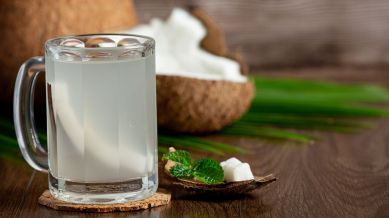Dengue cases rising in Bengaluru, Mumbai, Kolkata: A dietician lays out a daily diet plan, what to eat and drink, what to avoid
Adequate hydration helps maintain electrolyte balance, regulates body temperature and supports platelet production.

Written by Deeksha Sehwag
Currently, we are seeing many patients of dengue fever, most of whom are unaware of the role hydration plays in the body. It causes severe dehydration because of nausea, diarrhoea, high fever, sweating and lack of appetite. In most cases, dehydration results in complications rather than the infection itself.
Why is hydration a saviour?
Fluid management is critical in dengue due to persistent high fever, nausea and anorexia, all of which predispose patients to dehydration and electrolyte imbalance. These increase the risk of complications such as dengue haemorrhagic fever or shock. During dengue, there is a loss of plasma or water from the blood but adequate fluid intake can keep your blood volume up. Patients should be encouraged to maintain adequate oral hydration fluids such as water, oral rehydration solution (ORS), coconut water, vegetable soups, clear broths, fresh fruit juices (without added sugar), and herbal teas.
Adequate hydration helps maintain electrolyte balance, regulates body temperature and supports platelet production. Intravenous fluids may be warranted in severe cases, but for regular patients, oral intake remains the first line.
What should be the daily diet plan for dengue patients?
Early in the morning, you should start with a glass of lukewarm water with a few drops of lemon or coconut water to restore electrolytes.
For breakfast, have soft, easily digestible foods like vegetable upma, poha, or idli with a side of fresh papaya or kiwi — both are rich in vitamin C, which supports immunity and helps in platelet production.
Have fresh fruit juices such as pomegranate, orange, or watermelon mid-morning. These provide antioxidants and aid platelet recovery.
For lunch, I recommend a simple khichdi made with rice and moong dal, paired with lightly cooked vegetables and curd. This combination is light on the stomach, easy to digest and provides protein and probiotics. Vegetable soup or clear chicken broth (for non-vegetarians) with whole-wheat toast is another option.
Dinner is steamed rice with dal, sautéed vegetables or soft chapati with vegetable curry. Avoid oily or spicy foods that may irritate the stomach. A glass of warm turmeric milk to enhance immunity and promote restful sleep is recommended at bed time.
What nutrients should you prioritise?
Proteins are essential for tissue repair and immune function (dal, eggs, paneer, lean chicken). Vitamin C and antioxidants support immunity and blood vessel health, which is crucial to prevent plasma leaks. Have papaya, guava and citrus fruits. While having fluids and electrolytes, avoid caffeinated beverages, fried foods, and processed items that exacerbate dehydration or gastric irritation.
An individualised diet plan that emphasises hydration, micronutrients and digestible protein sources plays a pivotal role in dengue recovery. Clinical nutrition thus acts as a supportive therapy alongside medical management, improving patient comfort and outcomes.
(Sehwag is senior dietician, Fortis Healthcare)